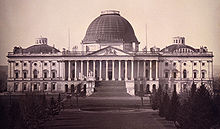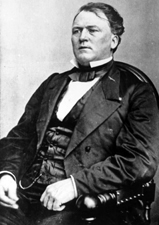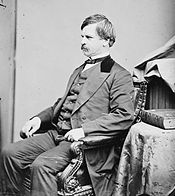34th United States Congress
| 34th United States Congress | |
|---|---|
33rd ← → 35th | |
 United States Capitol (1846) | |
March 4, 1855 – March 4, 1857 | |
| Members | 62 senators 234 representatives 7 non-voting delegates |
| Senate majority | Democrat |
| Senate President | Vacant |
| House majority | Opposition coalition |
| House Speaker | Nathaniel P. Banks (A) |
| Sessions | |
| 1st: December 3, 1855 – August 18, 1856 2nd: August 21, 1856 – August 30, 1856 3rd: December 1, 1856 – March 4, 1857 | |
The 34th United States Congress was a meeting of the legislative branch of the United States federal government, consisting of the United States Senate and the United States House of Representatives. It met in Washington, D.C., from March 4, 1855, to March 4, 1857, during the last two years of Franklin Pierce's presidency. The apportionment of seats in the House of Representatives was based on the 1850 United States census. The Whig Party, one of the two major parties of the era, had largely collapsed, although many former Whigs ran as Republicans or as members of the "Opposition Party." The Senate had a Democratic majority, and the House was controlled by a coalition of Representatives led by Nathaniel P. Banks, a member of the American Party.
Major events
- March 30, 1855: Elections were held for the first Kansas Territory legislature. Missourians crossed the border in large numbers to elect a pro-slavery body.
- July 2, 1855: The Kansas territorial legislature convened in Pawnee and began enacting proslavery laws.
- November 21, 1855: Large-scale Bleeding Kansas violence began with events leading to the Wakarusa War between antislavery and proslavery forces.
- December 3, 1855 – February 2, 1856: The election for Speaker of the House requires 133 ballots, the longest and most contentious speaker election in House history.[1][2]
- January 24, 1856: President Franklin Pierce declared the new Free-State Topeka government in Bleeding Kansas to be in rebellion.
- January 26, 1856: First Battle of Seattle: Marines from the USS Decatur drove off Indian attackers after an all-day battle with settlers.
- February, 1856: Tintic War broke out in Utah.
- February 18, 1856: The American Party (Know-Nothings) nominated their first Presidential candidate, former President Millard Fillmore.
- May 21, 1856: Lawrence, Kansas, captured and burned by pro-slavery forces (the "Sacking of Lawrence").
- May 22, 1856: Representative Preston Brooks of South Carolina attacking Senator Charles Sumner, beating him with a cane in the hall of the Senate, for a speech Sumner had made attacking Southerners who sympathized with the pro-slavery violence in Kansas ("Bleeding Kansas"). Sumner was unable to return to duty for 3 years while he recovered; Brooks became a hero across the South.
- May 24, 1856: Pottawatomie massacre
- June 2, 1856: Battle of Black Jack
- August 30, 1856: Battle of Osawatomie
- November 4, 1856: 1856 United States presidential election: Democrat James Buchanan defeated former President Millard Fillmore, representing a coalition of "Know-Nothings" and Whigs, and John C. Frémont of the fledgling Republican Party.
- November 17, 1856: On the Sonoita River in present-day southern Arizona, the United States Army established Fort Buchanan to help control new land acquired in the Gadsden Purchase.
- January 9, 1857: The 7.9 Mw Fort Tejon earthquake affects Central and Southern California with a maximum Mercalli intensity of IX (Violent).
Major legislation
- August 18, 1856: Guano Islands Act, ch. 164, 11 Stat. 119
Treaties
- January 26, 1855: Point No Point Treaty signed in the Washington Territory. (Ratified March 8, 1859. Proclaimed April 29, 1859)
- July 1, 1855: Quinault Treaty signed, Quinault and Quileute ceded their land to the United States. (Ratified March 8, 1859. Proclaimed April 11, 1859)

Jesse D. Bright

James M. Mason

Nathaniel P. Banks
Party summary
The count below identifies party affiliations at the beginning of this Congress. Changes resulting from subsequent replacements are shown below in the "Changes in membership" section.
During the elections for this Congress, opponents to the Democrats used the Whig party label inconsistently and not at all in some states. Hence in this Congress, and in accordance with the practice of the Senate and House, representatives not associated with the Democratic Party or the American Party are labeled as "Opposition." This is the first example in U.S. history of a form of coalition government in either house of Congress.
Senate
| Affiliation | Party (Shading indicates control) |
Total | ||||||
|---|---|---|---|---|---|---|---|---|
| American (Know Nothing) (A) |
Democratic (D) |
Opposition coalition | Vacant | |||||
| Free Soil (FS) |
Republican (R) |
Whig (W) | ||||||
| End of previous Congress | 1 | 38 | 5 | 0 | 17 | 61 | 1 | |
| Begin | 2 | 35 | 2 | 7 | 9 | 55 | 7 | |
| End | 40 | 1 | 11 | 8 | 62 | 0 | ||
| Final voting share | 3.2% | 64.5% | 32.3% | |||||
| Beginning of next Congress | 4 | 37 | 0 | 20 | 0 | 61 | 1 | |
House of Representatives
The parties that opposed the Democrats joined a coalition and formed the majority. The Know Nothings caucused with the Opposition coalition.
| Affiliation | Party (Shading indicates control) |
Total | |||||||
|---|---|---|---|---|---|---|---|---|---|
| Democratic (D) |
Opposition Caucus | Other | Vacant | ||||||
| American (Know Nothing) (A) |
Opposition (O) |
Republican (R) | |||||||
| End of previous Congress | 156 | 0 | 76 | 0 | 2 | 234 | 0 | ||
| Begin | 82 | 51 | 100 | 0 | 0 | 233 | 1 | ||
| End | 96 | 1 | 230 | 4 | |||||
| Final voting share | 35.7% | 64.3% | 0.0% | ||||||
| Beginning of next Congress | 127 | 14 | 0 | 92 | 0 | 233 | 1 | ||
Leadership
Senate
- President: Vacant
- President pro tempore: Jesse D. Bright (D), until June 9, 1856
- Charles E. Stuart (D, June 9, 1856 – June 10, 1856
- Jesse D. Bright (D), June 11, 1856 – January 6, 1857
- James M. Mason (D), from January 6, 1857
House of Representatives
- Speaker: Nathaniel P. Banks (A), elected February 2, 1856, on the 133rd ballot
- Democratic Caucus Chairman: George Washington Jones
Members
This list is arranged by chamber, then by state. Senators are listed in order of seniority, and representatives are listed by district.
Senate
Senators were elected by the state legislatures every two years, with one-third beginning new six-year terms with each Congress. Preceding the names in the list below are Senate class numbers, which indicate the cycle of their election. In this Congress, Class 1 meant their term ended with this Congress, requiring reelection in 1856; Class 2 meant their term began in the last Congress, requiring reelection in 1858; and Class 3 meant their term began in this Congress, requiring reelection in 1860.
|
|
 2 Democrats 1 Democrat and 1 Republican 2 Republicans 2 Whigs 2 Know-Nothings
|
House of Representatives
The names of members of the House of Representatives are preceded by their district numbers.
Changes in membership
The count below reflects changes from the beginning of the first session of this Congress.
Senate
| State (class) |
Vacated by | Reason for change | Successor | Date of successor's formal installation[a] |
|---|---|---|---|---|
| New Hampshire (2) |
Vacant | Charles G. Atherton (D) died during the previous Congress. Jared W. Williams (D) was appointed November 29, 1853, to continue the term, but his term was deemed expired July 15, 1854, and the legislature failed to elect a successor. A successor was finally elected July 30, 1855. |
John Parker Hale (R) | July 30, 1855 |
| New Hampshire (3) |
Vacant | Legislature failed to elect on time. Successor was elected. |
James Bell (R) | July 30, 1855 |
| Alabama (3) |
Vacant | Legislature failed to elect on time. Incumbent was then re-elected November 26, 1855. |
Benjamin Fitzpatrick (D) | November 26, 1855 |
| Pennsylvania (3) |
Vacant | Legislature failed to elect on time. Successor elected January 14, 1856. |
William Bigler (D) | January 14, 1856 |
| Missouri (3) |
Vacant | Elected but took seat late on January 12, 1857. | James S. Green (D) | January 12, 1857 |
| California (3) |
Vacant | Legislature failed to elect on time. Incumbent was then re-elected January 13, 1857. |
William M. Gwin (D) | January 13, 1857 |
| Indiana (3) |
Vacant | Legislature failed to elect on time. Senator elected February 4, 1857. |
Graham N. Fitch (D) | February 4, 1857 |
| Delaware (2) |
John M. Clayton (W) | Died November 9, 1856. Successor was appointed. |
Joseph P. Comegys (W) | November 19, 1856 |
| Maine (1) |
Hannibal Hamlin (D) | Resigned January 7, 1857, to become Governor of Maine. Successor was elected January 16, 1857. |
Amos Nourse (R) | January 16, 1857 |
| Delaware (2) |
Joseph P. Comegys (W) | Appointment expired January 14, 1857, upon successor's election. | Martin W. Bates (D) | January 14, 1857 |
| Iowa (3) |
James Harlan (FS) | Owing to irregularities in the legislative proceedings the Senate declared the seat vacant January 5, 1857. Incumbent was subsequently re-elected January 29, 1857, to fill the vacancy caused by his ouster. |
James Harlan (R) | January 29, 1857 |
House of Representatives
- Replacements: 6
- Democrats: 2 seat net loss
- Opposition: 4 seat net gain
- Deaths: 4
- Resignations: 5
- Contested election: 1
- Total seats with changes: 10
| District | Vacated by | Reason for change | Successor | Date of successor's formal installation[a] |
|---|---|---|---|---|
| Illinois 8th | Vacant | Rep-elect Lyman Trumbull resigned in previous congress after being elected to the US Senate | James L. D. Morrison (D) | Seated November 4, 1856 |
| Missouri 5th | John G. Miller (O) | Died May 11, 1856 | Thomas P. Akers (A) | Seated August 18, 1856 |
| Virginia 1st | Thomas H. Bayly (D) | Died June 23, 1856 | Muscoe R. H. Garnett (D) | Seated December 1, 1856 |
| South Carolina 3rd | Laurence M. Keitt (D) | Resigned July 15, 1856, after being censured in his role in the assault on US Senator Charles Sumner. He was subsequently re-elected to fill the vacancy | Laurence M. Keitt (D) | Seated August 6, 1856 |
| South Carolina 4th | Preston Brooks (D) | Resigned July 15, 1856, after assaulting US Senator Charles Sumner. He was subsequently re-elected to fill the vacancy | Preston Brooks (D) | Seated August 1, 1856 |
| Illinois 7th | James C. Allen (D) | House declared on July 18, 1856, he was not entitled to seat. He was subsequently re-elected to fill the vacancy | James C. Allen (D) | Seated November 4, 1856 |
| New Mexico Territory At-large | José M. Gallegos (D) | Contested election July 23, 1856 | Miguel A. Otero (D) | Seated July 23, 1856 |
| Kansas Territory At-large | John W. Whitfield (D) | House declared August 1, 1856, the seat vacant. He was subsequently re-elected to fill the vacancy | John W. Whitfield (D) | Seated December 9, 1856 |
| Vermont 1st | James Meacham (O) | Died August 23, 1856 | George T. Hodges (R) | Seated December 1, 1856 |
| Illinois 5th | William A. Richardson (D) | Resigned August 25, 1856 | Jacob C. Davis (D) | Seated November 4, 1856 |
| South Carolina 4th | Preston Brooks (D) | Died January 27, 1857 | Vacant | Not filled this term |
| New York 20th | Orsamus B. Matteson (O) | Resigned February 27, 1857 | Vacant | Not filled this term |
| New York 23rd | William A. Gilbert (O) | Resigned February 27, 1857 | Vacant | Not filled this term |
| New York 33rd | Francis S. Edwards (A) | Resigned February 28, 1857 | Vacant | Not filled this term |
Committees
List of committees and their party leaders.
Senate
- Agriculture (Chairman: Philip Allen)
- American Association for the Promotion of Science (Select)
- Atmospheric Telegraph Between Washington and Baltimore (Select)
- Audit and Control the Contingent Expenses of the Senate (Chairman: Josiah J. Evans)
- Claims (Chairman: Richard Brodhead)
- Commerce (Chairman: Hannibal Hamlin then Henry Dodge)
- Distributing Public Revenue Among the States (Select)
- District of Columbia (Chairman: Albert G. Brown)
- Engrossed Bills (Chairman: Jacob Collamer)
- Finance (Chairman: Robert M. T. Hunter)
- Foreign Relations (Chairman: James M. Mason)
- French Spoilations (Select)
- Indian Affairs (Chairman: William K. Sebastian)
- Judiciary (Chairman: Andrew P. Butler)
- Library (Chairman: James A. Pearce)
- Loss of Original Papers of Mark and Richard Bean (Select)
- Mexican Claims Commission (Select)
- Manufactures (Chairman: William Wright)
- Military Affairs (Chairman: John B. Weller)
- Militia (Chairman: Sam Houston)
- Naval Affairs (Chairman: Stephen Mallory)
- Ordnance and War Ships (Select)
- Pacific Railroad (Select)
- Patents and the Patent Office (Chairman: Charles T. James)
- Pensions (Chairman: George Wallace Jones)
- Post Office and Post Roads (Chairman: Thomas J. Rusk)
- Printing (Chairman: Robert W. Johnson)
- Private Claims Commission (Select)
- Private Land Claims (Chairman: Judah P. Benjamin)
- Protection of Life and Health in Passenger Ships (Select)
- Public Buildings (Chairman: James A. Bayard)
- Public Lands (Chairman: Charles E. Stuart)
- Retrenchment (Chairman: Stephen Adams)
- Revolutionary Claims (Chairman: Josiah J. Evans)
- Roads and Canals (Chairman: John Slidell)
- Sickness on Emigrant Ships (Select)
- Tariff Regulation (Select)
- Territories (Chairman: Stephen A. Douglas)
- Whole
House of Representatives
- Accounts (Chairman: Benjamin B. Thurston)
- Agriculture (Chairman: David P. Holloway)
- Claims (Chairman: John Hickman)
- Commerce (Chairman: Elihu B. Washburne)
- District of Columbia (Chairman: Orsamus B. Matteson)
- Elections (Chairman: Israel Washburn Jr.)
- Engraving (Chairman: William H. Kelsey)
- Expenditures in the Navy Department (Chairman: Thomas L. Harris)
- Expenditures in the Post Office Department (Chairman: John Pettit)
- Expenditures in the State Department (Chairman: Preston S. Brooks)
- Expenditures in the Treasury Department (Chairman: Henry Waldron)
- Expenditures in the War Department (Chairman: Joshua H. Jewett)
- Expenditures on Public Buildings (Chairman: Fayette McMullen)
- Foreign Affairs (Chairman: Alexander C. M. Pennington)
- Indian Affairs (Chairman: Benjamin Pringle)
- Invalid Pensions (Chairman: Andrew Oliver)
- Judiciary (Chairman: George A. Simmons)
- Manufactures (Chairman: Ezra Clark Jr.)
- Mileage (Chairman: William H. Sneed)
- Military Affairs (Chairman: John A. Quitman)
- Militia (Chairman: John C. Kunkel)
- Naval Affairs (Chairman: Samuel P. Benson)
- Patents (Chairman: Edwin B. Morgan)
- Post Office and Post Roads (Chairman: Daniel Mace)
- Private Land Claims (Chairman: Gilchrist Porter)
- Public Buildings and Grounds (Chairman: Edward Ball)
- Public Expenditures (Chairman: Sidney Dean)
- Public Lands (Chairman: Henry Bennett)
- Revisal and Unfinished Business (Chairman: Alvah Sabin)
- Revolutionary Claims (Chairman: David Ritchie)
- Revolutionary Pensions (Chairman: Jacob Broom)
- Roads and Canals (Chairman: James Knox)
- Rules (Select)
- Standards of Official Conduct
- Territories (Chairman: Galusha A. Grow)
- Ways and Means (Chairman: Lewis D. Campbell)
- Whole
Joint committees
- Amending the Constitution on Presidential and Vice Presidential Elections
- Enrolled Bills (Chairman: Rep. James Pike)
- The Library (Chairman: Rep. William Aiken)
- Printing (Chairman: Rep. Matthias H. Nichols)
- San Francisco Disaster
Caucuses
- Democratic (House)
- Democratic (Senate)
Employees
Legislative branch agency directors
Senate
- Chaplain: Henry Slicer (Methodist), until December 4, 1855
- Henry C. Dean (Methodist), until December 8, 1856
- Stephen P. Hill (Baptist), elected December 8, 1856
- Secretary: Asbury Dickins
- Sergeant at Arms: Dunning R. McNair
House of Representatives
- Chaplain: None
- Clerk: John W. Forney, until February 4, 1856
- William Cullom, elected February 4, 1856
- Doorkeeper: Nathan Darling
- Messenger: Thaddeus Morrice
- Postmaster: Robert Morris
- Sergeant at Arms: Adam J. Glossbrenner
- Reading Clerks: [data missing]
See also
- 1854 United States elections (elections leading to this Congress)
- 1856 United States elections (elections during this Congress, leading to the next Congress)
Notes
References
- ^ "The longest and most contentious Speaker election in its history". United States House of Representatives: History, Art & Archives. Archived from the original on June 20, 2012. Retrieved January 4, 2023.
- ^ "The Opening of the 34th Congress". United States House of Representatives: History, Art & Archives. Archived from the original on September 15, 2012. Retrieved January 4, 2023.
- Martis, Kenneth C. (1989). The Historical Atlas of Political Parties in the United States Congress. New York: Macmillan Publishing Company.
- Martis, Kenneth C. (1982). The Historical Atlas of United States Congressional Districts. New York: Macmillan Publishing Company.
External links
- Statutes at Large, 1789-1875
- Senate Journal, First Forty-three Sessions of Congress
- House Journal, First Forty-three Sessions of Congress
- Biographical Directory of the U.S. Congress
- U.S. House of Representatives: House History
- U.S. Senate: Statistics and Lists
- Congressional Directory for the 34th Congress, 1st Session. 1856.
- Congressional Directory for the 34th Congress, 3rd Session.

